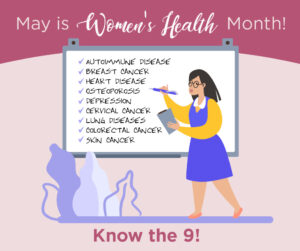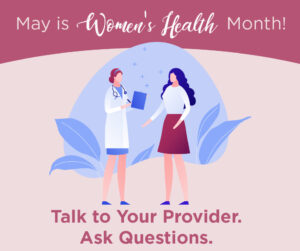 May is Women’s Health Month. In this article, we look at nine of the most common health issues that impact the lives of women and what steps women can take to make sure they stay healthy!
May is Women’s Health Month. In this article, we look at nine of the most common health issues that impact the lives of women and what steps women can take to make sure they stay healthy!
Autoimmune Disease
Autoimmune diseases are more widespread than most people think. At least 23.5 million Americans suffer from the disorder, and about 75 percent of autoimmune diseases occur in women, leading the National Institute of Health to officially designate it as a major women’s health issue. Scientists believe that genetics and hormonal changes are two of the reasons for the prevalence of the disease in women. Having an autoimmune disease increases the risk of having another. That’s the reason it’s so important for women to become more knowledgeable about this group of illnesses.
There are more than 100 diseases caused by autoimmune responses. Here are four of the most common.
Lupus
Women are up to 10 times more likely than men to have lupus, which can attack the joints, skin, kidneys, blood cells, brain, heart and lungs.
Multiple Sclerosis (MS)
With MS, the body’s immune system attacks a coating that protects the nerves, causing the communication between the brain and the body to be disrupted.
Rheumatoid Arthritis (RA)
RA is a chronic inflammation of the lining of the joints, usually in the hands and feet, which become painful and swollen. The disease can affect anyone, but it is most prevalent in women over 40. If it goes unchecked, RA can damage cartilage and the bones. Joints can become loose and painful, lose their mobility and become deformed. Joint damage cannot be reversed, so early diagnosis followed by aggressive treatment is important.
Thyroid Diseases
These include Graves’ disease, in which the body produces too much of the thyroid hormone, and Hashimoto’s thyroiditis, where the body doesn’t make enough of the hormone.
Take Action: There is usually no single test that can diagnose an autoimmune disease or one factor that causes it. However, if you feel something is wrong, insist that your symptoms be taken seriously, especially if they include:
- Fatigue
- Joint pain and swelling
- Skin problems
- Abdominal pain or digestive issues
- Recurring fever
- Swollen glands
Additionally, there are everyday things you can do to simply take better care of yourself, while also potentially reducing your risk for developing an autoimmune disease. For example, eat a nutritious diet, limit processed food, get enough sleep, exercise, reduce stress, and keep up-to-date on the latest information about your medications.
Breast Cancer
Because breast cancer is the most common cancer in women. One in eight will be diagnosed. However, with early detection, treatment is highly successful, with a 98 percent survival rate. A mammogram is the most effective screening tool for detecting breast cancer early before any symptoms appear.
If you have any of the risk factors for breast cancer, be sure to discuss them with your healthcare provider. You may need to have a mammogram at an earlier age and/or more often. Some of these risk factors include:
- Family History: If you have a first-degree relative (mother, daughter, sister) who has had breast or ovarian cancer, your risk is doubled.
- Previous Breast Cancer: Cancer in one breast results in a three- to four-fold increased risk of cancer in the other breast.
- Breast Density: Women with denser breast tissue have a higher risk for breast cancer.
You should also see your healthcare provider immediately if you notice any of the following:
- A lump in the breast, in or near the armpit, or near the collarbone
- Swelling
- Skin redness or irritation
- Thickening or dimpling of the skin
- Pain in the breast or nipple
- Changes in the nipple, such as it turning inward
- Discharge from the nipple that is not breast milk
Lower Your Risk of Breast Cancer:
- Limit your alcohol: The risk of breast cancer is 20 percent higher for women who consume two to three alcoholic drinks per day.
- Don’t smoke. If you do smoke, quit. It’s the single best thing you can do to improve your health.
- Control your weight. After menopause, being overweight or obese increases your risk.
- Stay physically active: Regular exercise appears to reduce the risk of breast cancer by 10 to 20 percent, especially in postmenopausal women.
Take Action: Mammograms are often free for women over age 40 and who have no symptoms of breast cancer. Check with your insurance company to see if a free mammogram is available to you. The actual exam takes about 10 to 15 minutes, and the entire appointment usually takes less than an hour. That’s not much time at all when you consider the potential life-saving benefit of detecting breast cancer early.
Heart Disease
Heart disease is the #1 health concern for American women, responsible for about 20 percent of all female deaths in the United States. Although more men die of heart disease then women, females are often under-diagnosed. Women often experience a heart attack or stroke differently than men because their symptoms are often much more subtle and therefore harder to detect. For example, instead of the crushing chest pain associated with heart attacks in men, women may just have a little bit of jaw pain, discomfort in the neck, shoulder and upper back, shortness of breath or nausea. Because these symptoms are less obvious, women may suffer more significant heart damage before they seek medical help.
Take Action: Have your blood pressure checked regularly and talk to your primary health provider or a cardiologist about your risks.
Osteoporosis
Osteoporosis causes bones to become weak and brittle. Approximately one in two women over age 50 will break a bone because of osteoporosis. Fortunately, it’s never too late to keep your bones strong and avoid fractures. Having enough calcium and Vitamin D in your diet and engaging in bone-bearing exercises, such as lifting light weights, are two of the best ways to prevent osteoporosis.
In addition to being female, other risk factors for osteoporosis include:
- Small Thin-Boned Frame
- Family History
- Infrequent Menstrual Cycles and Estrogen Loss due to Menopause
- Sedentary Lifestyle
- Smoking
- Excessive Alcohol Use
Take Action: Have a bone density mineral test at least every one to two years starting at age 65 or even sooner if you are at risk for osteoporosis.
Depression
Depression affects more women than men. About 12 million women experience a depressive episode each year compared to about six million men.
Risk factors for depression include:
- Hormonal changes, especially after pregnancy or during menopause
- A previous episode of depression
- A family history of depression
- Serious chronic illness
- Substance abuse
- A stressful event, such as a job loss or death
- Childhood history of abuse
- Taking medicines for high blood pressure or seizures that can trigger depression
Take Action: If you are feeling depressed, talk to your healthcare provider or schedule an appointment with a psychiatrist.
Cervical Cancer
Cervical cancer is the most common type of what are called the gynecological cancers (the others are ovarian, uterine, vaginal and vulva). Fortunately, it is also the easiest to detect with a simple Pap test. The main cause of cervical cancer is HPV (Human Papillomavirus). If you are between the ages of 25 and 65, talk to your doctor about when you need to have a Pap test and/or an HPV test. For women older than 65, testing should stop if your previous tests have been normal.
Take Action: Talk to your gynecologist about having a pelvic exam and Pap test.
Lung Diseases
Lung cancer kills more women than any other type of cancer. Although smoking is the number-one cause of lung cancer, 20 percent of women who develop the disease have never smoked a cigarette.
COPD (chronic obstructive pulmonary disease) is a common lung disease that makes it difficult to breathe. More than seven million American women suffer from COPD. Many more are undiagnosed or misdiagnosed with asthma. Symptoms include a cough, mucus production and wheezing.
Take Action: Guidelines now recommend that anyone between the ages of 50 to 80 who has a 20 pack-year smoking history and currently smokes or has quit within the past 15 years should be screened. A “pack-year” is smoking a pack a day for a year. Talk to your healthcare provider to see if you should be screened.
Colorectal Cancer
Colorectal cancer is the third leading cause of cancer-death in the United States. Great progress has been made in recent years in fighting colorectal cancer. Screening tests, such as a colonoscopy, have the ability to remove pre-cancerous growths called polyps, which prevents the cancer from occurring. Unfortunately, about one in three American adults age 50 to 75 are not up to date with their colorectal screening.
Take Action: Guidelines now recommend screening for colorectal cancer should start at age 45. Talk to your healthcare provider about your risk factors to determine your testing frequency.
Skin Cancer
Melanoma is the most serious type of skin cancer. Unfortunately, women aged 49 and younger have a higher probability of developing melanoma than any other cancer except breast and thyroid cancer.
Take Action: Once a month, perform a self-exam and check for any changes in your skin, especially new or bleeding moles. Contact a dermatologist immediately if you notice any changes.
 So many of the health issues that affect women are either preventable or treatable when detected early. Screenings and self-examination play such important roles, and are easy to do! Ask your primary care provider about your risks, and what you can do now to help secure a healthier future!
So many of the health issues that affect women are either preventable or treatable when detected early. Screenings and self-examination play such important roles, and are easy to do! Ask your primary care provider about your risks, and what you can do now to help secure a healthier future!
Sources: Johns Hopkins Medicine, CDC, webmd, Mental Health America, National Osteoporosis Foundation, National Cancer Institute


